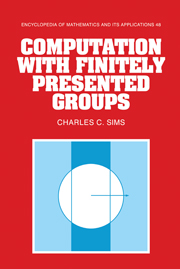Book contents
- Frontmatter
- Contents
- Preface
- Introduction
- 1 Basic concepts
- 2 Rewriting systems
- 3 Automata and rational languages
- 4 Subgroups of free products of cyclic groups
- 5 Coset enumeration
- 6 The Reidemeister-Schreier procedure
- 7 Generalized automata
- 8 Abelian groups
- 9 Polycyclic groups
- 10 Module bases
- 11 Quotient groups
- Appendix Implementation issues
- Bibliography
- Index
9 - Polycyclic groups
Published online by Cambridge University Press: 06 March 2010
- Frontmatter
- Contents
- Preface
- Introduction
- 1 Basic concepts
- 2 Rewriting systems
- 3 Automata and rational languages
- 4 Subgroups of free products of cyclic groups
- 5 Coset enumeration
- 6 The Reidemeister-Schreier procedure
- 7 Generalized automata
- 8 Abelian groups
- 9 Polycyclic groups
- 10 Module bases
- 11 Quotient groups
- Appendix Implementation issues
- Bibliography
- Index
Summary
Polycyclic groups form a broad class of finitely presented groups in which extensive computation is possible. This chapter discusses the basic structure and properties of polycyclic groups and presents algorithms for computing with elements and subgroups of polycyclic groups. All finite solvable groups are polycyclic. The literature on algorithms for computing with finite solvable groups is too extensive to cover in detail here. See (Laue, Neubüser, & Shoenwaelder 1984), (Mecky & Neubüser 1989), and (Glasby & Slattery 1990). Emphasis will be placed on those algorithms which apply to infinite as well as finite polycyclic groups. Various computations with polycyclic groups have been shown to be possible in principle but have not yet been shown to be practical for interesting groups. Some of these algorithms will be mentioned, but details will not be given. By combining the rewriting techniques of Chapter 2 with the methods developed in this chapter, one obtains algorithms for solving a wide range of problems in polycyclic-by-finite groups. These are groups which have a polycyclic subgroup of finite index. The polycyclic-by-finite groups make up the largest class of finitely presented groups in which most computational problems concerning elements and subgroups have algorithmic solutions.
A word of caution is in order. In coset enumeration, right cosets of subgroups are used almost exclusively. However, in studying polycyclic groups it is traditional to use left cosets. It would be possible to present both subjects using the same type of cosets, but it seems best to remain consistent with other authors.
Information
- Type
- Chapter
- Information
- Computation with Finitely Presented Groups , pp. 383 - 447Publisher: Cambridge University PressPrint publication year: 1994
